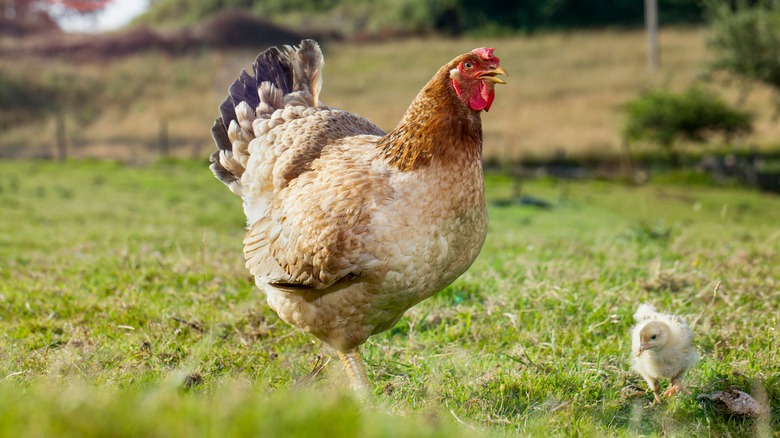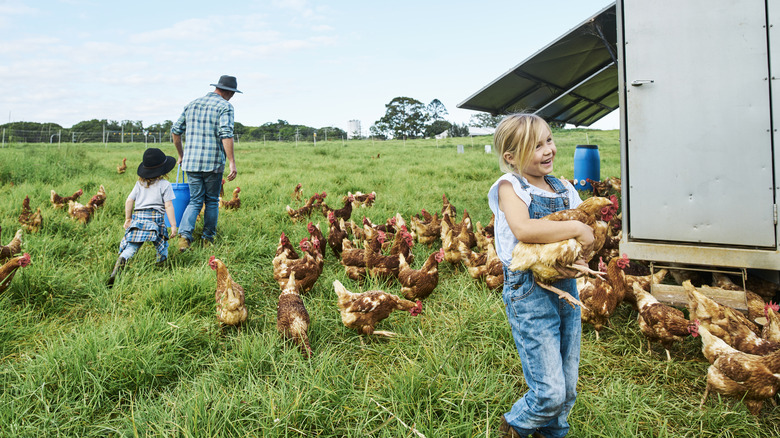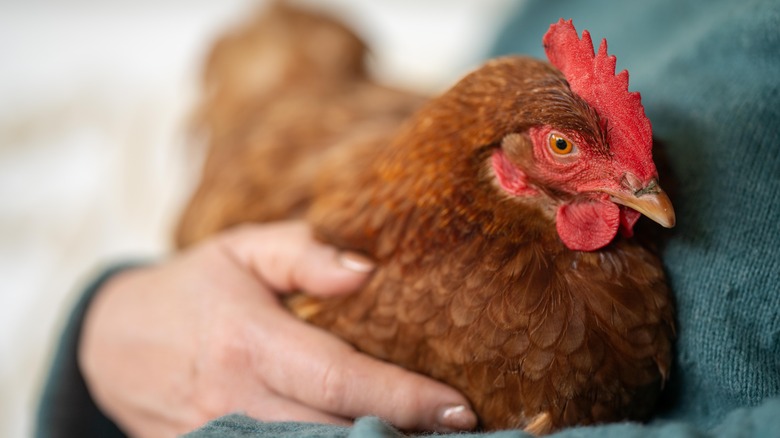What The Heck Does It Mean If Your Chicken Is Labeled 'Pasture Raised'?
It's no secret that the labels on the foods we buy can be incredibly confusing. And when it comes to understanding the tags on meat products, there's a lot of information to process — especially with chicken goods. They're now the most-consumed meat in the world, and it makes sense. We love everything from that perfect piece of Southern fried chicken to some classic Buffalo wings. We can't get enough!
So, let's talk about a term that you may have seen popping up more and more: "pasture raised." Here's where things can get super confusing — chicken can also be free range, which sounds like a similar label. So, what's the difference? In a nutshell, pasture-raised chickens spend most of their lives outside. This is very different from free-range chickens and those that are raised in factory farms, which are production facilities that rear animals in indoor areas.
There's been increasing awareness of the conditions present in many of these facilities in recents years. Nevertheless, the United States Department of Agriculture released its quinquennial Census of Agriculture report in 2024, and it showed that the number of mega factory farms are on the rise, packing more animals into less space and pushing smaller facilities out of the equation. However, the American Pastured Poultry Producers Association reported in 2023 that the number of farmers using a pasture-raised model was steadily increasing as well. It also stressed that there's a big difference between not only the lives of pasture-raised and free-range chickens, but in the quality of their meat as well.
Free-range chickens are not pasture raised
For the definition of pasture raised chickens, let's look to the American Pastured Poultry Producers Association. According to the organization's guidelines, chickens must spend most of their lives outside on grassy pasture land, and they have to regularly be moved to fresh regions. By comparison, that generally doesn't happen with chickens that are raised in a free-range environment.
Free-range means that chickens are raised in stationary barns and have access to an outdoor space. That's incredibly important, because there are no laws or guidelines in place regulating the size or quality of the area that free-range chickens have access to. In many cases, they can still be housed in crowded conditions with little opportunity to actually get outside. Pasture-raised chickens, on the other hand, are required to be raised on land that is maintained in such a way that it encourages natural behaviors like foraging for insects.
Farms that have systems in place for pasture-raised animals are lauded as being among the most ethical in raising their livestock. Chickens are generally hatched in a protected, climate-controlled environment, and are then moved to portable coops that are moved between fields with a mix of sunny and shaded areas. Not only does this help mimic a chicken's natural environment, but it's also been linked to healthier chickens and been found to help maintain a healthy environment — from soil health to the diversity and stability of the ecosystem.
Pasture-raised chickens are reportedly healthier, tastier, and more nutritious
Seeing a "pasture-raised" label is about more than just supporting the ethical and humane raising of animals in a more environmentally-friendly manner. According to TexasRealFood, when chickens are raised with access to the outdoors and a diet that includes naturally-foraged seeds and insects, their meat is more flavorful, more tender, and juicier. There's a nutritional difference, too — the white meat of pasture-raised chickens has been found to be higher in omega-3 fatty acids. That's a crucial kind of fat that's essential for healthy cell function and particularly necessary for heart, eye, and brain wellness. Research has found that when animals are raised on a healthier diet, that better nutrition is passed on to the creature that eats them — in this case, that's you. And that makes sense, right?
That applies to eggs from pasture raised chickens, too. If you see that "pasture-raised" label on your eggs, you can be pretty certain that they're going to be higher in antioxidants, omega-3 fatty acids, and vitamins A and D. That last part is incredibly important. Even though vitamin D has been linked to bone health and the prevention of cancer and heart disease, a 2011 Nutrition Research report estimated that about 42% of Americans were vitamin D deficient. For these reasons, the "pasture-raised" label is worth looking for.


